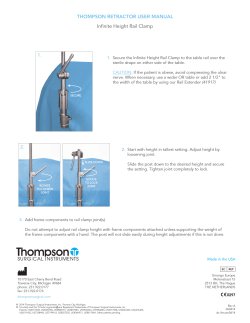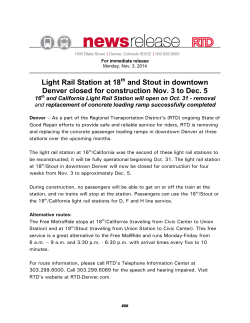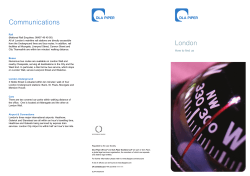
Issue no. 5, May 2015
Rail Working Group's Newsletter INSIDE TRACK Issue no. 5, May 2015 View this email in your Browser. INSIDE TRACK “Inside Track” keeps RWG members and colleagues up to date on the progress of the Luxembourg Protocol. You can be added onto the mailing list by clicking on “subscribe” at the bottom of the newsletter. Italian government to meet UNIDROIT in this month The UK position post-election Topic of the month: What constitutes an international interest? Special deal for RWG members Italian government to meet UNIDROIT in this month Officials from the Ministry of Foreign Affairs will be meeting UNIDROIT later this month in Rome to discuss implementation of the Cape Town Convention and as well as the Protocols, including the Luxembourg Rail Protocol. Representatives from the local rail industry will be present at the meeting as well as a delegation from the Rail Working Group. The UK position post-election The British government was constrained from moving forward on the ratification process until very recently because of the pending election. This has now passed and we believe that the new government will carry over its policy of facilitating private sector finance of the rail sector and move forward with ratification. In his manifesto, the Conservative Party committed itself to significant investment in both roads and rail on top of its commitment to build High-Speed 2, the new North-South railway linking up London with the West Midlands, Leeds and Manchester and then move to develop High-Speed 3 to join up with the North of the UK, with detailed commitments to provide new trains in many parts of the rail network. The Rail Working Group will be taking part in a delegation meeting with the British government in the coming days to ensure that it is now “full speed ahead” for the Rail Protocol in the UK. Topic of the month: What constitutes an international interest? The Luxembourg Protocol and the Cape Town Convention work together to create various rights for the holders of international interests. These rights include priority rights as well as repossession rights on default or insolvency by the debtor. Art. 2 of the Cape Town Convention sets out that an international interest arises in relation to “uniquely identifiable object” of the types of movable equipment mentioned in the Convention (Art. 2(3)) and which includes railway rolling stock where such interest is created in three separate ways. Either it is a security interest granted by a debtor charging or pledging the asset it owns to the creditor under the terms of a security agreement or it is vested in the seller under a conditional sale agreement where there is a title reservation in favour of the seller until the full purchase proceeds are paid or the interest arises in favour of a lessor under a leasing agreement. This is all in turn premised on the assumption that the debtor (charger/conditional purchaser/lessee) has its principal place of business in jurisdiction which has ratified the Luxembourg Protocol (and the Cape Town Convention). The holder of an international interest is not required to register it but would be well advised to do so since this will protect the creditor’s interest from any subsequently created international interest which is registered. But there are two other interesting aspects on should be considered. In certain cases under local law a lease agreement may be considered to be a security agreement and there may be other examples where the formal stated agreement may be re-categorised. Art. 2 (4) of the Convention states that the local legal categorisation by the applicable law is determinative. Art. 5 (3) makes it clear which law is applicable and specifically the domestic rules of that law. A second interesting issue is what constitutes a leasing agreement. This covers any relationship whereby one party grants a right of possession or control of an object to another against payment and regardless of the length of the agreement or what it is described as contractually. It may therefore be a short term licence or rental agreement and there may not even be a written contract. Inter-operator agreements whereby one operator pays the owner a daily rental based on the period of time the equipment is in an operator’s area of operation would clearly constitute a lease agreement. On the other hand an agreement described as a lease but which leaves possession and control in the hands of the lessor (for example a wet lease of a locomotive) is not a leasing agreement for those purposes. In principle a lease for 24 hours would still create an international interest in favour of the lessor and would be registrable if the lessee was located in a state which had ratified the Luxembourg Protocol. On a practical basis however we would expect that ultra-short term leases would not be registered unless there are any obvious threats to the rights of the lessor. Special Deal for RWG members Rail Working Group members are entitled to purchase Professor Goode’s official commentary on the Luxembourg Protocol at a 15% discount. If you wish to use this facility, please use the official form which you can find here. For copies of past newsletters click here. For information about membership of the RWG click here. Published by the Rail Working Group, a not for profit Association established under Swiss law. www.railworkinggroup.org E-mail address: howard.rosen@railworkinggroup.org The opinions express in articles or reports in this publication do not necessarily reflect the opinions or policy of Rail Working Group © 2015 Rail Working Group unsubscribe from this list | subscribe to this list |update subscription preferences
© Copyright 2025















